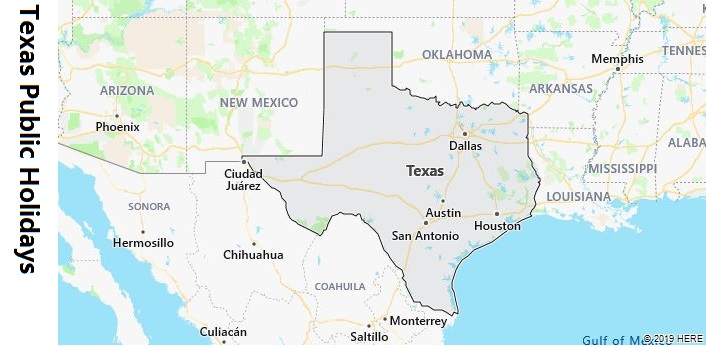Texas Holidays
Texas State Holidays
Searching for the public holidays in Texas? Most public holidays in Texas are treated like Sundays. This means that most of the Texas employees have a day off and all schools are closed on these office holidays. If you are planning a trip to Texas and want to know what the national and regional holidays are, check the details in the tables below.
List of Official Holidays in Texas in 2020
| # | Date | Holiday | Day |
| 1 | January 01 | New Year’s Day | Wednesday |
| 2 | January 19 | Confederate Heroes’ Day | Sunday |
| 3 | January 20 | Martin Luther King Jr. Day | Monday |
| 4 | February 17 | President’s Day | Monday |
| 5 | March 02 | Texas Independence Day | Monday |
| 6 | March 31 | Cesar Chavez Day | Tuesday |
| 7 | April 21 | San Jacinto Day | Tuesday |
| 8 | May 10 | Mother’s Day | Sunday |
| 9 | May 25 | Memorial Day | Monday |
| 10 | June 19 | Emancipation Day | Friday |
| 11 | June 21 | Father’s Day | Sunday |
| 12 | July 04 | Independence Day | Saturday |
| 13 | Aug 27 | Lyndon Baines Johnson Day | Thursday |
| 14 | September 07 | Labor Day | Monday |
| 15 | November 11 | Veterans Day | Wednesday |
| 16 | November 26 | Thanksgiving | Thursday |
| 17 | November 27 | Day after Thanksgiving | Friday |
| 18 | December 24 | Christmas Eve | Thursday |
| 19 | December 25 | Christmas Day | Friday |
| 20 | December 26 | Day after Christmas | Saturday |
List of Official Holidays in Texas in 2021
| # | Date | Holiday | Day |
| 1 | January 01 | New Year’s Day | Friday |
| 2 | January 18 | Martin Luther King Jr. Day | Monday |
| 3 | January 19 | Confederate Heroes’ Day | Tuesday |
| 4 | February 15 | President’s Day | Monday |
| 5 | March 02 | Texas Independence Day | Tuesday |
| 6 | March 31 | Cesar Chavez Day | Wednesday |
| 7 | April 21 | San Jacinto Day | Wednesday |
| 8 | May 09 | Mother’s Day | Sunday |
| 9 | May 31 | Memorial Day | Monday |
| 10 | June 19 | Emancipation Day | Saturday |
| 11 | June 20 | Father’s Day | Sunday |
| 12 | July 04 | Independence Day | Sunday |
| 13 | Aug 27 | Lyndon Baines Johnson Day | Friday |
| 14 | September 06 | Labor Day | Monday |
| 15 | November 11 | Veterans Day | Thursday |
| 16 | November 25 | Thanksgiving | Thursday |
| 17 | November 26 | Day after Thanksgiving | Friday |
| 18 | December 24 | Christmas Day | Friday |
| 19 | December 25 | Christmas Day | Saturday |
| 20 | December 27 | Day after Christmas | Monday |
| 21 | December 31 | New Year’s Day | Friday |















































